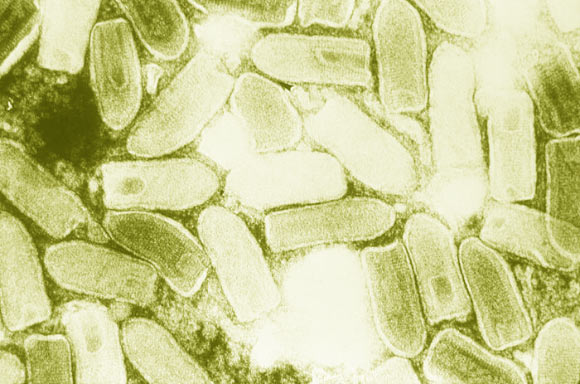Scientists at the University of Ottawa, Canada, have developed rhabdovirus-derived particles that can kill blood cancer (leukemia) cells and eradicate the disease in mice.

This electron micrograph shows particles of the vesicular stomatitis virus. Credit: Centers for Disease Control and Prevention.
“Our research indicated that a replicating virus might not be the safest or most effective approach for treating leukemia, so we decided to investigate whether we could make virus-derived particles that no longer replicate but still kill cancer,” said Dr David Conrad, who is a senior author of a study published in the Blood Cancer Journal.
“We were delighted to see that this novel therapy was very safe at high doses, and worked extremely well in our laboratory leukemia models. We hope to test this in patients in the near future.”
The team used UV light to transform the vesicular stomatitis Indiana virus and the wild-type Maraba virus into unique particles that could no longer replicate and spread, but could still enter cancer cells efficiently, kill them and stimulate a strong immune response against the cancer.
These particles were able to kill multiple forms of leukemia in the lab, including samples taken from local patients who had failed all other therapies. Normal blood cells were not affected.
This novel treatment was also successful in mouse models of leukemia.
In fact, 80 per cent of the mice that received the therapy had markedly prolonged survival and 60 per cent were eventually cured, while all of the untreated mice died of their leukemia within 20 days.
“Leukemia is a devastating disease that can be very difficult to treat, and new therapies are urgently needed,” Dr Conrad said.
“While we’re still at the early stages of this research, I think this therapy holds a lot of promise because it appears to have a potent, long-lasting effect on leukemia without the debilitating side effects of many cancer therapies used in the clinic right now.”
“We will likely see even better results once we optimize the dose in our preparations to advance this research into human clinical trials.”
______
Bibliographic information: Batenchuk C et al. 2013. Non-replicating rhabdovirus-derived particles (NRRPs) eradicate acute leukemia by direct cytolysis and induction of antitumor immunity. Blood Cancer Journal 3, e123; doi: 10.1038/bcj.2013.23







